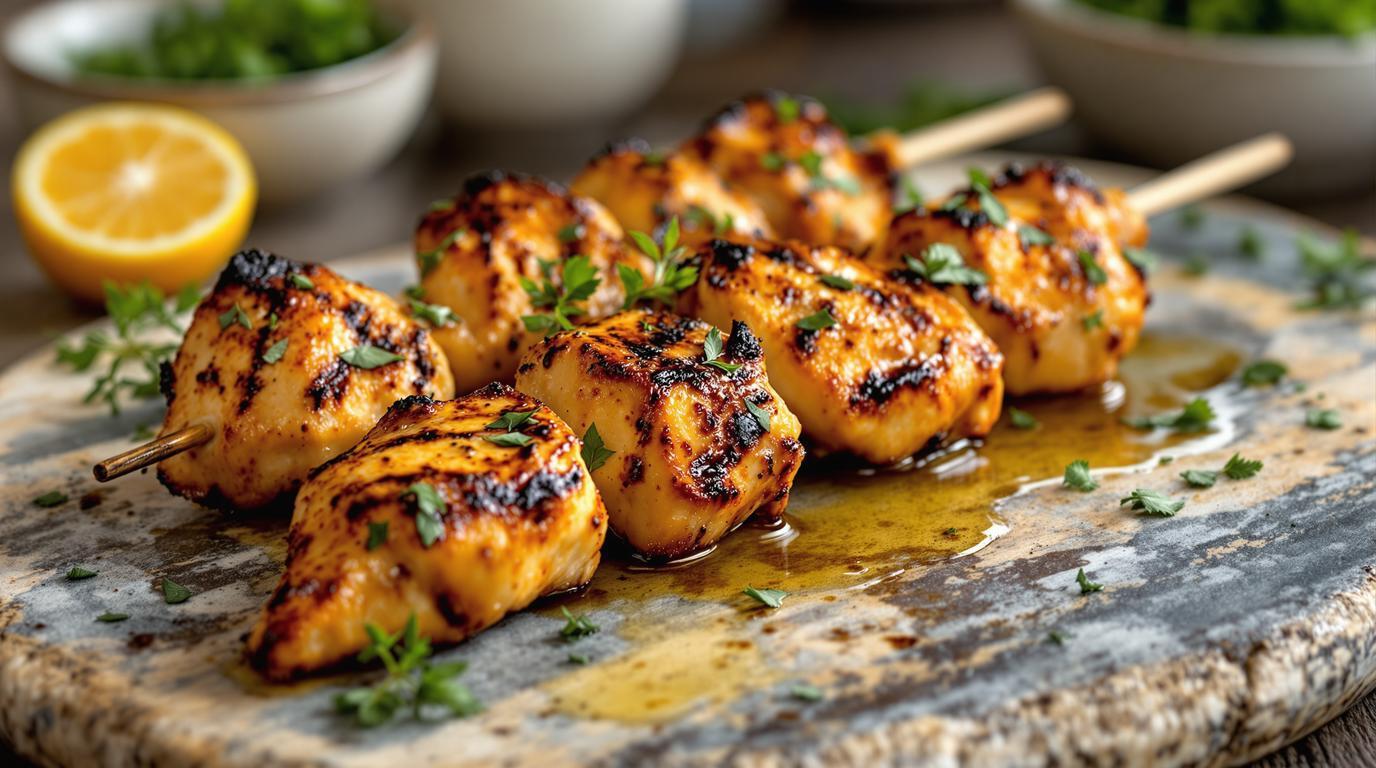There’s something magical about the way simple ingredients transform when given time to mingle. My grandfather taught me this lesson when I was just eight years old, standing beside him as he prepared his famous chicken skewers. “Alex,” he said with a wink, “the secret isn’t in fancy ingredients – it’s in patience.” These lemon-thyme chicken brochettes carry that wisdom, harnessing the power of Mediterranean flavors through an overnight marinade that takes ordinary chicken to extraordinary heights. The bright acidity of lemon juice tenderizes while the earthy perfume of thyme infuses every bite – a technique passed down through generations of Provençal families.
The Story Behind Brochettes de Poulet au Citron et Thym
Long before fancy equipment dominated kitchens, French countryside cooks mastered the art of building flavor through simple marinades. This recipe traces back to sun-drenched Provence, where wild thyme grows abundantly on hillsides and lemon trees dot family gardens. What makes these skewers truly special is their roots in practical cooking – grandmothers would prepare the marinade in the morning, allowing the chicken to absorb flavors all day while they tended to other chores, much like my approach to depression-era banana bread that wastes nothing.
Essential Ingredients
For 4 servings, you’ll need:
- 500g (1.1 lbs) chicken breast, cut into 2cm (¾-inch) chunks
- Juice of 2 large fresh lemons (about ¼ cup)
- 4 garlic cloves, finely minced
- 2 sprigs fresh thyme, leaves removed (or 1 tsp dried)
- 1 tsp ground cumin (optional but traditionally used in southern variants)
- 3 tbsp extra virgin olive oil
- 1 tsp sea salt
- ½ tsp freshly ground black pepper
- Optional: 1 red bell pepper and 8 spring onions for skewering
Chef’s Note: The quality of your olive oil matters tremendously here. Choose a fruity, robust variety from Provence if possible – it creates a silky marinade that penetrates deeply into the meat, similar to how I prepare the base for my cast iron skillet cheeseburgers.
The 24-Hour Transformation
The magic of this dish happens long before cooking begins:
- In a glass or ceramic bowl (never metal with acidic marinades), combine chicken pieces with minced garlic, thyme leaves, cumin if using, salt and pepper.
- Use your hands to massage the seasonings into the meat for 15-20 seconds, coating each piece evenly.
- Pour fresh lemon juice over the chicken – this begins the tenderizing process, breaking down tough proteins.
- Drizzle olive oil over everything, which helps carry fat-soluble flavors into the meat while preventing dryness.
- Cover tightly with plastic wrap and refrigerate for 12-24 hours. This isn’t just tradition – it’s science, allowing enzymes in the lemon juice to work their magic.
From Marinade to Masterpiece
When you’re ready to cook:
- If using wooden skewers, soak them in water for 30 minutes to prevent burning.
- Thread chicken pieces onto skewers, alternating with vegetables if desired.
- Bring your grill or broiler to medium-high heat (375°F/190°C).
- Cook skewers for 5-6 minutes per side, turning only once to develop proper caramelization.
- Reserve a tablespoon of marinade and brush onto skewers during the final minute of cooking for an extra flavor boost.
Chef’s Secret Techniques
The difference between good and exceptional brochettes lies in technique. Never overcrowd your skewers – leave small spaces between meat pieces to ensure even cooking. When grilling, resist the urge to constantly flip; each side needs uninterrupted heat to develop the perfect crust while staying juicy inside. This patient approach with heat sources is something I also emphasize when creating smoky BBQ cauliflower steaks.
For those without fresh thyme, oregano makes a respectable substitute, though it alters the flavor profile slightly. In a pinch, frozen lemon juice works, but nothing quite captures the brightness of fresh citrus with its essential oils.
Serving Traditions
In Provence, these brochettes typically arrive at the table alongside herb-flecked couscous or crusty bread perfect for soaking up juices. A chilled glass of Crozes-Hermitage white wine or a fruity Mediterranean rosé completes the experience. For a complete French-inspired meal, consider serving with French-style shepherd’s pie for guests with heartier appetites.
Modern chefs might experiment with adding ingredients like banana peel flour to their accompanying breads, but I prefer honoring the simplicity that makes this dish timelessly appealing.
As you gather around the table to enjoy these fragrant skewers, you’re participating in a tradition that stretches back generations – proving once again that patience and respect for ingredients create the most memorable meals. The humble chicken skewer becomes not just dinner, but a connection to the sun-drenched hillsides of Provence and the wisdom of cooks who came before us. Bon appétit!
